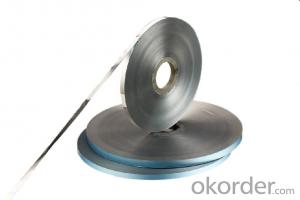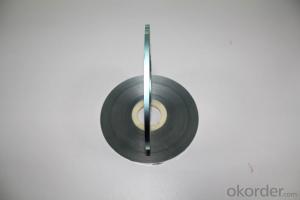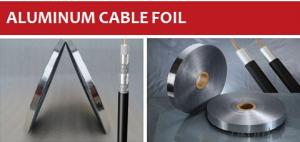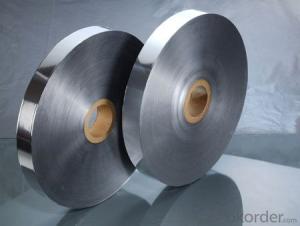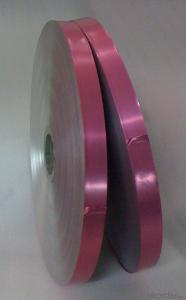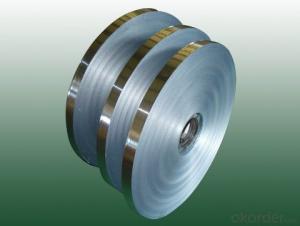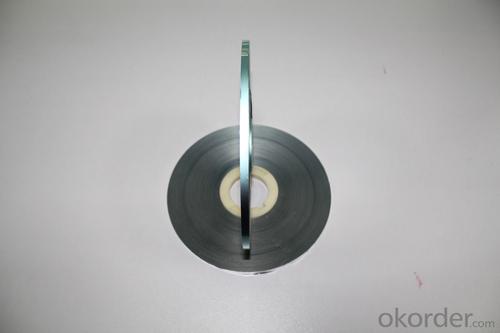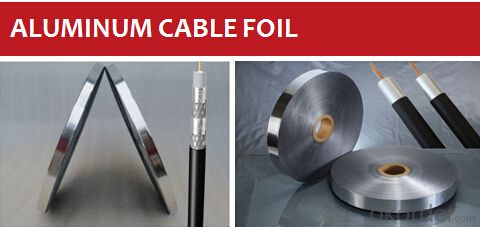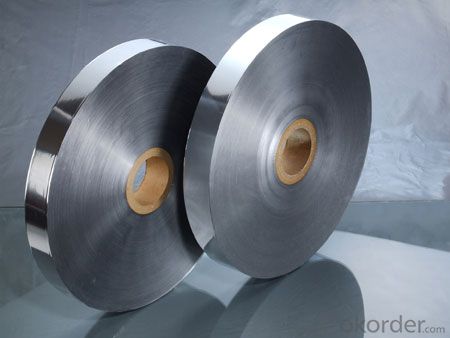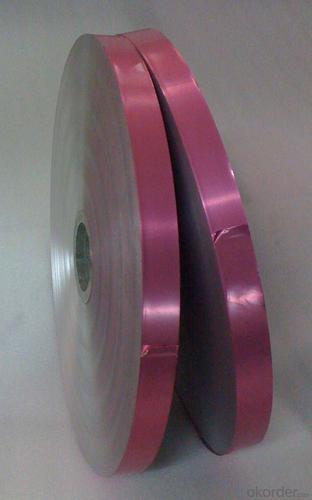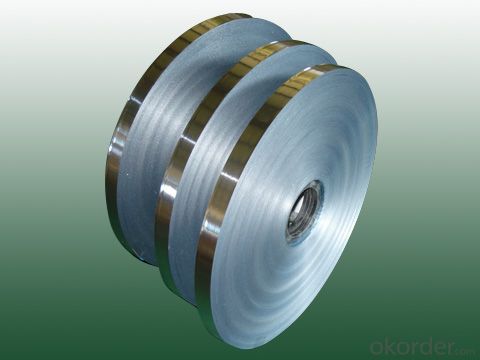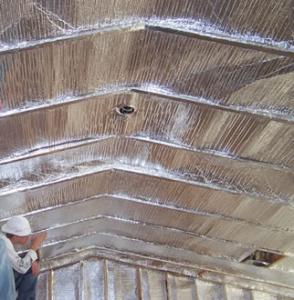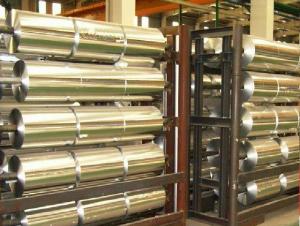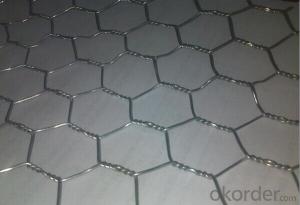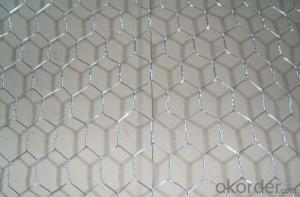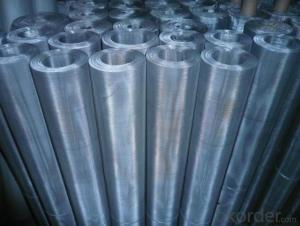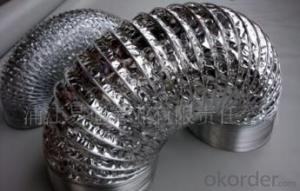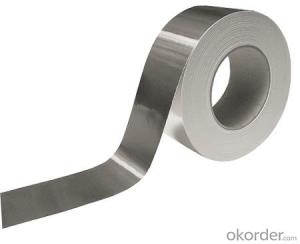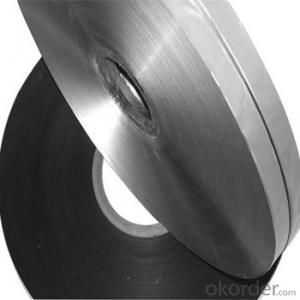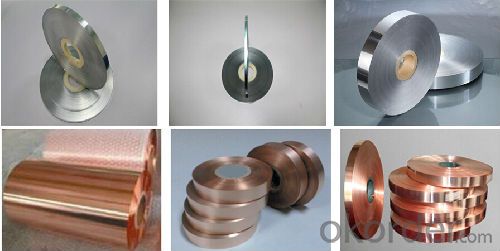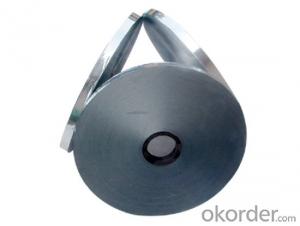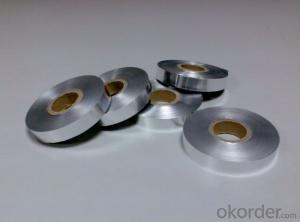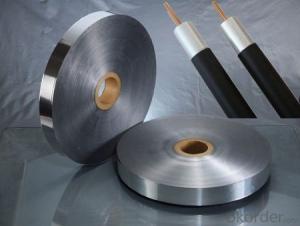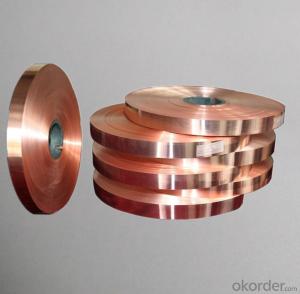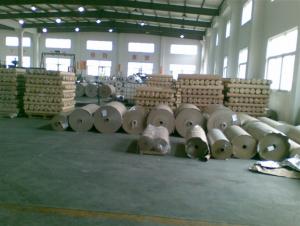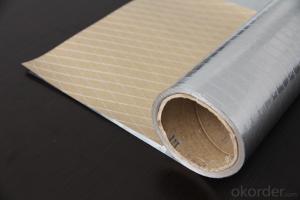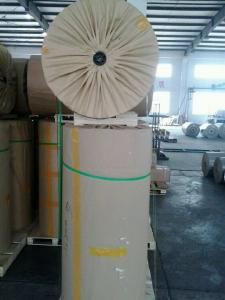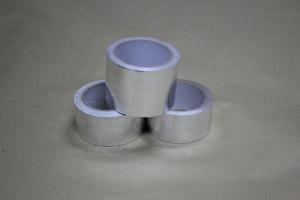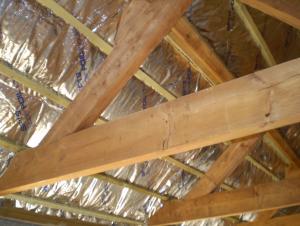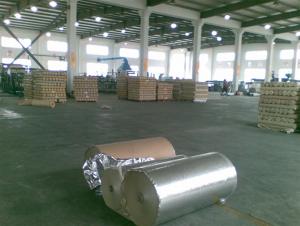Aluminum Foil Facing Coaxial Cable Shield Foil
- Loading Port:
- Shanghai
- Payment Terms:
- TT or LC
- Min Order Qty:
- 1000 m²
- Supply Capability:
- 1000000 m²/month
OKorder Service Pledge
OKorder Financial Service
You Might Also Like
Aluminum Mylar foil Shielding Foil for Coaxial Cable communication cable
1.Structure of Aluminum Mylar foil Shielding Foil Description:
Electrical cable is used to transfer electricity, information and the realization of electromagnetic energy transformation. The electrical cable in a broad term mainly indicates to cable and in a narrow term indicate insulation material. Its definition is the aggregation of different parts below: one or more insulation cores, the wrapping layers of the cores, the general protective layers and the outer protective layers. Cables also include additive conductor without insulator.
2.Main Features of the Aluminum Mylar foil Shielding Foil:
Aluminum Mylar foil Shielding Foil is applicable to the shielding of coaxial cable, local network wire, electronic communication cable and computer peripheral wire etc.
1.Thickness: min 6.5mic; width: 300-1000mm.
2. According to GB/T 3198-2010.
3.Usages: cable shield, candy wrap
3. Aluminum Mylar foil Shielding Foil Images
4. Aluminum Mylar foil Shielding Foil Specification
AL-PET laminated foil
Description: Apply for overall or individual twisted pair shield for electronic cable and local network cables, protect from external electromagnetic interference. Features option of LUBRITAPE apply to decrease 50% friction of aluminum surface.
Construction: Aluminum foil, Polyester film
CODE | TOTAL THICKNESS | ALU THICKNESS | GLUE | POLYESTER FILM | WEIGHT |
FP007012 | 22±3 | 7 | 3 | 12 | 38.8±5% |
FP010012 | 25±3 | 10 | 3 | 12 | 46.9±5% |
FP020020 | 43±3 | 20 | 3 | 20 | 83.8±5% |
FP025012 | 40±3 | 25 | 3 | 12 | 87.6±5% |
Special specifications are also available, according to customer’s order. | |||||
AL-PET-AL laminated foil
Description: resilient shielding in cable assembling and provide the enhanced shielding required in harsh environments.
Construction: Aluminum foil +Polyester film+ Aluminum foil
CODE | TOTAL THICKNESS | ALU THICKNESS | GLUE | POLYESTER FILM | GLUE | ALU THICKNESS | WEIGHT |
DFP007015 | 35±3 | 7 | 3 | 15 | 3 | 7 | 65±5% |
DFP009020 | 39±4 | 9 | 3 | 15 | 3 | 9 | 76±5% |
DFP015025 | 61±5 | 15 | 3 | 25 | 3 | 15 | 115±5% |
DFP025025 | 80±5 | 25 | 3 | 25 | 3 | 25 | 175±5% |
Special specifications are also available, according to customer’s order. | |||||||
Bonded AL-PET laminated foil
Description: A laminated aluminum-polyester-aluminum tape is fully bonded to the foam dielectric to provide 100% coverage, longitudinally applied over the polyethylene core and the tape minimizes signal leakage.
Construction: Aluminum foil + Polyester film + Aluminum foil + EMAA film
CODE | TOTAL THICKNESS | ALU THICKNESS | GLUE | POLYESTER FILM | GLUE | ALU THICKNESS | GLUE | EMAA | WEIGHT |
DFPH009012 | 65±5 | 9 | 3 | 12 | 3 | 9 | 3 | 25 | 98±5% |
DFPH009020 | 72±5 | 9 | 3 | 20 | 3 | 9 | 3 | 25 | 108±5% |
DFPH009025 | 75±5 | 9 | 3 | 25 | 3 | 9 | 3 | 25 | 114±5% |
DFPH010025 | 84±5 | 10 | 3 | 25 | 3 | 10 | 3 | 25 | 126±5% |
Special specifications are also available, according to customer’s order. | |||||||||
Copper polyester foil
Description: Copper foil, copper lamination foil typically use as shielding for low/medium voltage cable and radio frequency coaxial cable. The rolled annealing copper foil is flexible to wrap cable core, also it has the excellent physical properties, Polyester film provides electrical insulation and high mechanical properties.
Construction: Copper foil + Polyester film
CODE | TOTAL THICKNESS | CU THICKNESS | GLUE | POLYESTER FILM | WEIGHT |
CP018012 | 33±3 | 18 | 3 | 12 | 175±10% |
CP007020 | 46±3 | 18 | 3 | 25 | 195±10% |
CP015012 | 30±3 | 15 | 3 | 12 | 160±10% |
Special specifications are also available, according to customer’s order. | |||||
5.FAQ
We have organized several common questions for our clients,may help you sincerely:
① Where you used this foil?
Aluminum Mylar foil Shielding Foil is used for cable shield, candy wrap for the shielding of coaxial cable, local network wire, electronic communication cable and computer peripheral wire etc.
②How to guarantee the quality of the products?
We have established the international advanced quality management system,every link from raw material to final product we have strict quality test;We resolutely put an end to unqualified products flowing into the market. At the same time, we will provide necessary follow-up service assurance.
③How long can we receive the product after purchase?
In the purchase of product within three working days, We will arrange the factory delivery as soon as possible. The pecific time of receiving is related to the state and position of customers.Commonly 7 to 10 working days can be served.
- Q: What precautions should be taken when using aluminum foil facing in construction or other applications?
- <p>When using aluminum foil facing, safety measures include ensuring proper ventilation to prevent build-up of fumes, wearing protective gear such as gloves and masks to avoid skin and respiratory irritation, and following manufacturer's guidelines for safe handling and application. It's also crucial to avoid contact with open flames or high heat sources as aluminum foil can melt or ignite. Always clean up spills immediately to prevent slipping hazards and ensure that the working area is well-lit to avoid accidents.</p>
- Q: What are some suggestions to ensure plastic containers are used in a more hygienic and long-lasting manner?
- <p>To use plastic containers more hygienically and durably, follow these tips: 1) Always wash containers with warm soapy water and rinse thoroughly before and after each use. 2) Avoid putting hot foods or liquids directly into plastic containers to prevent warping and potential chemical leaching. 3) Do not use scratched or damaged containers as they can harbor bacteria and are more likely to break. 4) Store containers in a dry, cool place away from direct sunlight to prevent degradation. 5) Regularly inspect containers for signs of wear and replace them when necessary. 6) Use containers within their recommended temperature range to maintain their integrity and safety.</p>
- Q: Is it possible to use aluminum foil with a reflective side for food freezing purposes?
- <p>Yes, aluminum foil facing can be used for freezing food. It helps to maintain the temperature and prevent freezer burn by acting as a barrier to air and moisture. However, it's important to ensure that the foil is food-grade and does not have any sharp edges that could puncture the food packaging. Additionally, it's recommended to wrap the food securely in the foil to minimize air exposure and maximize the preservation of the food's quality and taste.</p>
- Q: Is it safe and effective to use aluminum foil with a reflective side for baking purposes?
- <p>Yes, aluminum foil facing can be used for baking. The shiny side of aluminum foil is often used to cover baking dishes to prevent food from drying out, to create a steam effect, or to reflect heat for even cooking. However, it's important to avoid direct contact between the foil and the heating elements of the oven to prevent fire hazards. Always follow the manufacturer's guidelines for safe use and placement of aluminum foil in your oven.</p>
- Q: Is it safe to use recycled aluminum foil for cooking or baking purposes?
- <p>Recycled aluminum foil facing is not recommended for cooking or baking. While aluminum foil itself is safe for cooking and can be used to cover dishes or line baking sheets, recycled foil may have impurities or contaminants from previous uses. It may also be thinner and less durable, leading to potential tearing or puncturing, which can result in food contamination. For safety and food quality, it's best to use new, high-quality aluminum foil for cooking and baking.</p>
- Q: What are the unique cleaning techniques for maintaining aluminum foil facing surfaces?
- <p>Aluminum foil facing requires gentle cleaning to avoid scratching the surface. Use a soft cloth or sponge with warm water and mild dish soap to clean the surface. Avoid abrasive materials like steel wool or harsh chemicals, as they can damage the aluminum. After cleaning, dry the surface thoroughly to prevent water spots. For stubborn stains, a mixture of water and white vinegar can be used, but always test on a small, inconspicuous area first. Regular cleaning will help maintain the appearance and functionality of aluminum foil facing.</p>
- Q: What are the advantages of using aluminum foil as a reflective surface in various applications, particularly in health contexts?
- <p>Using aluminum foil facing provides several health benefits, particularly in cooking and food preservation. It helps retain moisture in foods, reducing the need for added fats and oils, which can contribute to a healthier diet. Reflective aluminum foil can also help distribute heat evenly in ovens, ensuring food cooks more uniformly and reduces the risk of overcooking or burning. Additionally, it can help in food reheating, ensuring that food is heated evenly and thoroughly, which is important for food safety. In some cases, aluminum foil can also be used to create a barrier against harmful UV rays in tanning beds, although this is not recommended due to potential health risks associated with tanning. Overall, the use of aluminum foil facing can contribute to healthier cooking practices and food safety.</p>
- Q: This question asks for a comparison of the benefits and drawbacks associated with the use of aluminum foil facing in various applications.
- <p>Aluminum foil facing offers several advantages, including excellent heat reflection, which can improve insulation and energy efficiency in buildings. It also provides a moisture barrier, which can protect against water damage and mold growth. Additionally, aluminum foil facing is lightweight, easy to install, and resistant to corrosion. However, there are disadvantages such as its limited strength and durability compared to other materials, making it prone to punctures and tears. It can also be less aesthetically pleasing and may require additional protective layers for long-term use. Furthermore, improper disposal can contribute to environmental concerns due to its non-biodegradable nature.</p>
- Q: Is it possible to use aluminum foil with a reflective side to cook pizzas or grilled cheese sandwiches?
- <p>Yes, you can use aluminum foil facing to make pizzas or grilled cheese sandwiches. The reflective side of the foil can help distribute heat evenly, which is beneficial for cooking these items evenly. However, it's important to ensure that the foil does not come into direct contact with the heating element of your oven, as it can cause a fire hazard. Always follow safety guidelines and adjust the cooking time and temperature as needed to prevent burning or melting the foil.</p>
- Q: This question asks for a comparison between domestic and foreign aluminum foil, specifically focusing on their differences.
- <p>The differences between domestic and foreign aluminum foil facing primarily lie in material quality, manufacturing processes, and market positioning. Domestic aluminum foil often uses locally sourced materials and may have variations in thickness and quality, while foreign foil might employ higher-grade materials for enhanced durability and consistency. Manufacturing processes abroad may incorporate advanced technology, leading to better surface smoothness and uniformity. Additionally, foreign aluminum foil is often marketed as premium, targeting niche segments with specific requirements for quality and performance. Domestic foil, on the other hand, is generally more affordable and caters to a broader market, including everyday household use.</p>
Send your message to us
Aluminum Foil Facing Coaxial Cable Shield Foil
- Loading Port:
- Shanghai
- Payment Terms:
- TT or LC
- Min Order Qty:
- 1000 m²
- Supply Capability:
- 1000000 m²/month
OKorder Service Pledge
OKorder Financial Service
Similar products
Hot products
Hot Searches
Related keywords
